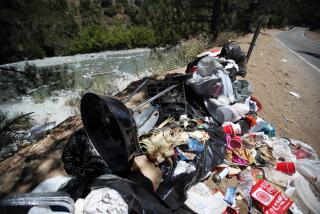Cooking up energy savings
- Share via
There’s a lot of action in any kitchen, so it’s a good place to start changing habits and chipping away at petroleum use.
The big-ticket items are the appliances.
Refrigerators, dishwashers, ovens, microwaves and stoves all consume energy, and that power often involves a fossil fuel of some sort -- so I count using less power as cutting back on my oil/natural gas addiction. The machines that came with our 19-year-old tract house have pooped out and been replaced with more energy-efficient versions. Our stove is the exception; it’s old and uses natural gas.
I can’t feel smug, though, because the river of petroleum-based products that flows through our kitchen easily offsets those gains and would probably get us an F rating from green gurus such as actor and author Ed Begley Jr.
Let’s start with our worst sin: those plastic grocery bags.
My husband does the food shopping. He brings everything home in them, and then, like clockwork, throws them in the trash. I retrieve them for recycling, but we’re still among those who together consume 12 million barrels’ worth of oil in plastic bags each year in this country, said Crissy Trask, author of “It’s Easy Being Green.”
In my house, however, plastic-bag policy is not my call. My husband, who does many other good things for the environment, can’t bring himself to tote around the totes. To maintain household harmony and avoid the disaster that would ensue if I took over grocery shopping and cooking, that change will have to wait.
I feel better knowing that Begley and his wife, Rachelle, readily admit to friendly friction over certain habits and products that she is not willing to give up.
“I try to be very understanding,” Begley told me. “You don’t run up Mt. Everest. You get to base camp, and you get acclimated . . . and not everybody’s going to make it to the summit.”
Next up, plastic water bottles.
I thought it helped that I refilled the bottles with filtered tap water for as long as I could before tossing them in the recycling bin and buying a new case. But that wasn’t nearly enough. And to make matters worse, my husband now drinks those vitamin waters, which end up being single-use items because the flavoring sticks to the bottles.
To nix bottled water at home, I needed containers that were easy to carry, refillable and dishwasher-safe. Trask suggested substitutes by Klean Kanteen, Sigg or CamelBak (sold online or at sports stores such as REI). A pair of 18-ounce Klean Kanteen stainless steel bottles costs $31. A single 20-ounce Sigg bottle, aluminum with your choice of colorful designs, was about $20.
But I like to keep six or more bottles filled, refrigerator-chilled and ready to go, so the upfront outlay for stainless steel seemed a bit steep for my purposes. Instead, I went with CamelBak’s half-liter plastic Better Bottle with Classic Cap, sold by SummitHut.com for $8 each. The reusable bottle is the right size, dishwasher-safe and free of bisphenol A, a plastics chemical some believe is a health hazard.
Other steps: We can shun superfluous plastic packaging, buy things made from recycled plastic and use sandwich bags and dish soaps that aren’t petroleum-based. We also can try harder to buy locally produced food and in bulk. That chips away at the fuel use involved in moving food around.
It’s a start.
--
elizabeth.douglass@latimes.com


